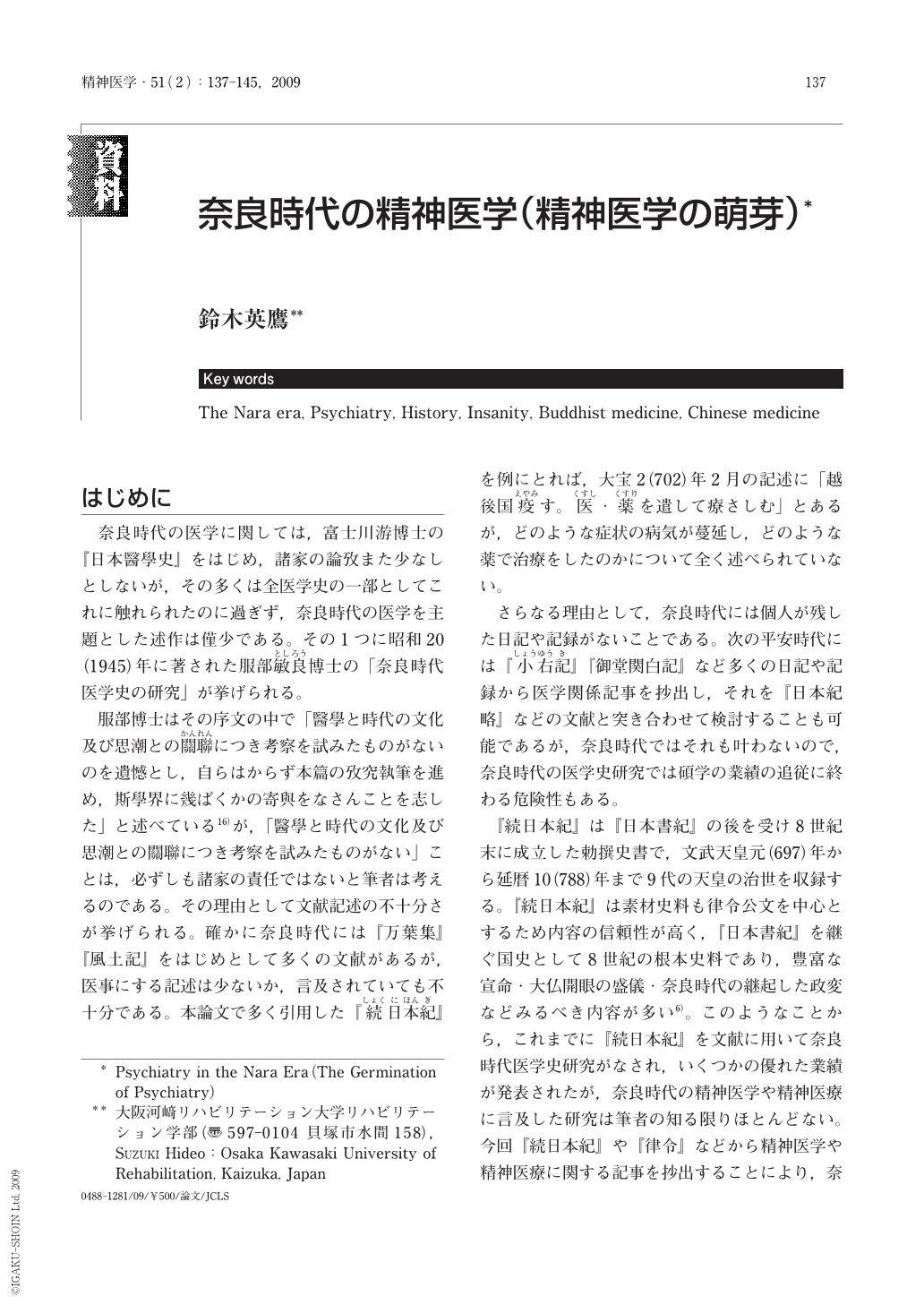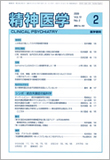Japanese
English
- 有料閲覧
- Abstract 文献概要
- 1ページ目 Look Inside
- 参考文献 Reference
はじめに
奈良時代の医学に関しては,富士川游博士の『日本醫學史』をはじめ,諸家の論攷また少なしとしないが,その多くは全医学史の一部としてこれに触れられたのに過ぎず,奈良時代の医学を主題とした述作は僅少である。その1つに昭和20(1945)年に著された服部敏良博士の「奈良時代医学史の研究」が挙げられる。
服部博士はその序文の中で「醫學と時代の文化及び思潮との關聯につき考察を試みたものがないのを遺憾とし,自らはからず本篇の攷究執筆を進め,斯學界に幾ばくかの寄與をなさんことを志した」と述べている16)が,「醫學と時代の文化及び思潮との關聯につき考察を試みたものがない」ことは,必ずしも諸家の責任ではないと筆者は考えるのである。その理由として文献記述の不十分さが挙げられる。確かに奈良時代には『万葉集』『風土記』をはじめとして多くの文献があるが,医事にする記述は少ないか,言及されていても不十分である。本論文で多く引用した『続日本紀』を例にとれば,大宝2(702)年2月の記述に「越後国疫す。医・薬を遣して療さしむ」とあるが,どのような症状の病気が蔓延し,どのような薬で治療をしたのかについて全く述べられていない。
さらなる理由として,奈良時代には個人が残した日記や記録がないことである。次の平安時代には『小右記』『御堂関白記』など多くの日記や記録から医学関係記事を抄出し,それを『日本紀略』などの文献と突き合わせて検討することも可能であるが,奈良時代ではそれも叶わないので,奈良時代の医学史研究では碩学の業績の追従に終わる危険性もある。
『続日本紀』は『日本書紀』の後を受け8世紀末に成立した勅撰史書で,文武天皇元(697)年から延暦10(788)年まで9代の天皇の治世を収録する。『続日本紀』は素材史料も律令公文を中心とするため内容の信頼性が高く,『日本書紀』を継ぐ国史として8世紀の根本史料であり,豊富な宣命・大仏開眼の盛儀・奈良時代の継起した政変などみるべき内容が多い6)。このようなことから,これまでに『続日本紀』を文献に用いて奈良時代医学史研究がなされ,いくつかの優れた業績が発表されたが,奈良時代の精神医学や精神医療に言及した研究は筆者の知る限りほとんどない。今回『続日本紀』や『律令』などから精神医学や精神医療に関する記事を抄出することにより,奈良時代の人々が精神障害の原因や治療をどのようにとらえ,精神障害者はどのように扱われていたかを紹介する。そして精神障害者の処遇については,奈良時代よりも現代のほうが優れているといえるのか,古の時代に学ぶべきことはないかを精神医療福祉を志すものとして検討したい。
なお,続日本紀については新日本古典文学体系の『続日本紀』全5巻(岩波書店刊),律令については日本思想体系の『律令』(岩波書店刊)から引用した。また薬物の読み方は『正倉院薬物』1)の記載に従った。
The Nara period lasted for 84 years occurred approximately 1,300 years ago. During this period, Japan began to evolve into a nation that was governed by laws rather than by force, and its rulers strove to lead the nation on the basis of the principles of Buddhism and the rule of law. In the medical field too, laws were being established;2 main schools of thought in medical science existed during the Nara period―Buddhist medicine and Chinese medicine, which was influenced by Taoism.
Completed at the end of the eighth century, Shoku Nihongi is a historical source that records the reign of 9 emperors from the year 697 AD to 788 AD. It is a very reliable historical source that includes valuable information on political changes that occurred during the Nara period, thus making it well worth reading. Traditionally, research on the history of medical science during the Nara period has been carried out using Shoku Nihongi;however, few researchers have shown interest in its references to psychiatric medicine and treatment. This study examined psychiatric medicine as it was practiced during the Nara period by focusing on Shoku Nihongi and Buddhist scriptures.
The results included the following:stress was considered a cause of disease, and mental healing, was considered to be the most important treatment for the physical diseases.

Copyright © 2009, Igaku-Shoin Ltd. All rights reserved.


